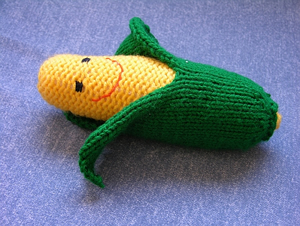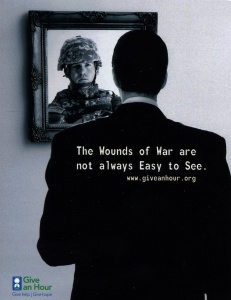November 12th, 2008 by Dr. Val Jones in Audio, Expert Interviews
1 Comment »
Penny Kris-Etherton, Ph.D., R.D., Distinguished Professor of Nutrition (Department of Nutritional Sciences, Penn State University) about what she learned at the American Dietetic Association Food & Nutrition Conference & Expo in Chicago.
Please listen to the podcast here: [audio:http://blog.getbetterhealth.com/wp-content/uploads/2008/11/pennykrisetherton.mp3]
Penny’s take home messages:
1. Corn is not evil. The vegetable itself can be quite nutritious, though high fructose corn syrup is an empty calorie food additive.
2. There is no magic food that will melt your fat away.
3. There is no magic pill that will help you lose weight. You must decrease your calorie intake and increase your exercise.
4. Increasing protein a little bit can increase satiety.
5. Omega-3 fatty acids and iron can improve brain health.
6. Regular fatty fish consumption can reduce the risk of heart disease (2 servings/week).
7. Food first – try to get all your nutrients from the foods you consume. Consider vitamins and supplements only after you’ve been unable to get your dietary needs met from food.
8. Fish oil supplements are safe and pure. There are differences in the amount of omega-3 fatty acids that the supplements deliver, so read the label carefully.
9. A healthy diet is about eating a broad range of nutritious food (don’t scrimp on your veggies), it’s not about supplementing a poor diet with some supplements.
10. Accurate nutrition information is really important. Two trusted sources are: MyPyramid.gov and the American Heart Association
**Listen to the podcast**
November 11th, 2008 by Dr. Val Jones in Health Tips
5 Comments »
Several people have asked me if corn syrup is the root of all evil. This cheap, high calorie sweetener is adding hidden calories to everything from spaghetti sauce to condiments to peanut butter. But is it actually worse for you than “regular” cane sugar? Is there something special about corn syrup that makes it worthy of national vilification?
The truth is that corn syrup isn’t any “worse” than any other highly refined sugar – there’s nothing special about corn that makes it harmful to consume (unless maybe if you’re allergic to corn, but that’s another story). The real issue is that we humans love sweet things, and that food product manufacturers are simply adding sweetener to their products to cater to our taste buds. In so doing, hidden calories add up… and waist lines expand in response.
Folks with diabetes understand how difficult it is to find unsweetened products these days, and they have to work extra hard to avoid the high fructose corn syrup in so many foods. For those of us who don’t have diabetes (yet?) we’d probably do well to follow their example and consciously cut down on our sugar intake if not to manage our insulin levels, but at least to avoid unnecessary calorie consumption.
I myself am a bit of a sugar addict by nature – I resolved to cut down on carbs a few months ago and have dropped 10 pounds already. I have learned to like unsweetened almond milk, unsweetened organic ketchup, and I make my own sauces and avoid refined flour products.
In my next post I’ll speak with Penny M. Kris-Etherton, Ph.D., R.D., Distinguished Professor of Nutrition, Penn State University about what she learned at the recent American Dietetic Association Food & Nutrition Conference & Expo (FNCE) in Chicago. She’ll explain why all the fear mongering about corn is a bit exaggerated.
November 10th, 2008 by Dr. Val Jones in News, Opinion
2 Comments »
“My daddy’s in Iraq, but he’s not dead yet.”
— 5-year-old son of a US Marine
Roughly 1.7 million Americans have been deployed to Iraq so far. An estimated 320,000 US military have received a traumatic brain injury in the Iraq war. Another 300,000 suffer from major depression or post traumatic stress disorder. The VA is not equipped to handle the mental health needs of all returning veterans and their families. What can we do?
The Give An Hour organization has challenged mental health professionals to donate 1 hour of their time/week to serve the needs of the military. If only 1 in 10 providers joined the program, there would be enough hours to cover the unmet needs.
I met with Dr. Barbara Romberg today to discuss her plans for the program. She envisions an in-office, phone, and online platform for Give An Hour. I sure hope that I can help out with the online platform one day.
If you’re a mental health professional, please consider joining the Give An Hour initiative. Our troops risked their lives for us, and others have sustained life-long injuries – some visible, some invisible.
And there are little boys out there, wondering if this is the day their daddy will die.
Let’s consider how we can be of comfort to those who are suffering on this Veterans Day.
November 9th, 2008 by Dr. Val Jones in Audio, Expert Interviews
5 Comments »
I was following an interesting conversation on Twitter between several nurses. They were expressing concern about how nursing stereotypes were damaging to their profession. I invited them to discuss the subject with me via podcast.I have summarized some key points below.
You can listen to the whole conversation here.
[audio:http://blog.getbetterhealth.com/wp-content/uploads/2008/11/nursing.mp3]
Participants:
Gina from Code Blog (6 year veteran blogger, and has spent 11 years as an ICU nurse)
Strong One from My Strong Medicine (an anonymous blogger, athletic trainer and nurse of 3 years)
Terri Polick from Nurse Ratched’s Place (has held various positions in nursing, including psychiatric nursing for 20 years)
Current Nursing Challenges:
1. Nursing Instructor Shortage – nursing instructors make about 25% of the salary of nurses who do clinical work. Therefore, there are long wait times to enter nursing school due to instructor shortages. Many students can’t afford to wait, and choose other careers.
2. Inequality of Respect – some nurses feel that they have to continually prove themselves despite their training and qualifications. Patients often express disappointment or annoyance when they see a nurse practitioner (rather than a physician) in a group practice. Some doctors still expect nurses to give up their chairs when they enter the room.
3. Nursing Stereotypes – the “naughty nurse” and “nurse Ratched” images are still very much in the forefront of peoples minds when they think of nursing as a specialty. Some people believe that nurses simply pass out pills and make coffee, when in reality they are active in complex technical procedures and saving lives. These stereotypes and misconceptions denigrate the education and technical expertise of nurses.
4. Primary Care Doesn’t Pay: nurse practitioners incur higher debt and have lower salaries than specialist nurses. Just as in the medical profession, there are no incentives for nurses to choose careers in primary care.
Strengths of Nursing:
1. Nurses Are Better And Brighter Than Ever – since getting into nursing school is so competitive, the quality of individuals who are entering nursing school has never been higher.
2. Job Flexibility – nurses can easily transition to part time work for maternity purposes. Nursing careers offer a wide variety of work experiences – from nursing home work, to cardiothoracic surgery. One license offers hundreds of various opportunities.
3. Job Satisfaction – saving lives and serving patients contribute to a sense of job satisfaction.
What can be done to improve and advance the US nursing profession?
1. Establish an Office of the National Nurse. The National Nursing Network organization is promoting this initiative. The National Nurse would act as a government spokesperson for nurses- promoting preventive medicine, increasing awareness of nursing, and securing financial support for nurse education. He or she would be the chief nurse officer of the US public health service.
2. Do not be afraid to speak up. Nurses should feel comfortable defending their professional ideals, and discouraging stereotypes.
3. Blog to raise awareness of nursing challenges and successes.
**Listen to the podcast**
November 9th, 2008 by Dr. Val Jones in Medblogger Shout Outs, Opinion
2 Comments »
As many of you know, I’ve been pretty upset about the “never events” policy put forward by CMS. That’s because they took a theoretically reasonable punitive rule (Medicare will not pay hospitals for patient care related to gross medical errors, aka “never events,” like wrong-side surgery) and made it far too general (never events include delirium, falls, and any infection – even a cold). It is absolutely impossible to prevent these sorts of things 100% of the time. So how should “never events” be defined?
The Happy Hospitalist nails it:
Can the never event happen at home? If the answer is yes, it cannot be a never event. It is a natural event. Even the criminal events that nobody can foresee are considered never events. Tell me how a hospital can prevent a random crazy family member or hospital guest from going berserk and assaulting an employee or patient. It’s impossible to predict or prevent.













